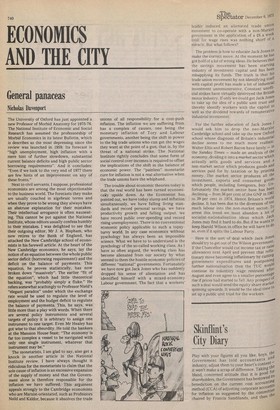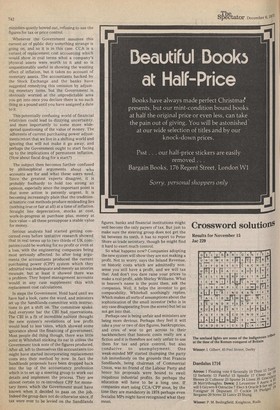Skinflint's City Diary
Play with your figures all you like, boys, the Government has told accountants and industry, adjust them to your heart's content — it won't make a scrap of difference. Taking the bland, concerned attitude that it is good for shareholders, the Government has bestowed its benediction on the current cost accounting method (CCA) of adjusting corporate accounts he chaired by Francis Sandilands, and then t it for inflation as suggested by the comm
ministers quietly bowed out, refusing to use the figures for tax or price control.
Whenever the Government assumes this earnest air of public duty something strange is going on, and so it is in this case. CCA is a variant of replacement cost accounting which would show in real terms what a company's physical assets were worth to it and so is unquestionably useful in showing the wasting effect of inflation, but it takes no account of monetary assets. The accountants backed by the Stock Exchange and the banks have suggested remedying this omission by adjusting monetary items, but the Government is obviously worried at the unpredictable area you get into once you declare there is no such thing as a pound until you have assigned a date to it.
This potentially confusing world of financial relativism could lead to dizzying uncertainty, and more importantly to some more widespread questioning of the value of money. The adherents of current purchasing power adjustments retort that we live in a shifting world and ignoring that will not make it go away, and perhaps the Government ought to start facing up to the implications of permanent inflation. (How about fiscal drag for a start?) The subject then becomes further confused by philosophical arguments about who accounts are for and what these users need. Since the greatest experts disagree, it is probably foolhardy to hold too strong an opinion, especially since the important point is that some action is patently urgent. It is becoming increasingly plain that the traditional historic cost methods produce misleading lies (nothing true or fair at all) at a time of inflation. Straight line depreciation, stocks at cost, work-in-progress at purchase plus, money at face value — all these presuppose a stable value for money.
Serious analysts had started getting concerned even before tentative research showed that in real terms up to two thirds of UK companies could be working for no profit or even at a loss, with the engineering companies being most seriously affected. So after long arguments the accountants produced the current purchasing power (CPP) system which they admitted was inadequate and merely an interim measure, but at least it showed there was a problem. They hoped management accounts would in any case supplement this with replacement cost calculations.
In steps the Government. Hold hard until we have had a look, came the word, and ministers set up the Sandilands committee with instructions to get a shift on. The committee spake. And everyone bar the CBI had reservations. The CBI in a fit of incredible naiveté thought the new system's revelations of low profit would lead to less taxes, which showed some ignorance about the financing of government. Most people did thing though, there was little point in Whitehall sticking its oar in unless the Government took note of the figures produced. After all, left to themselves the accountants too might have started incorporating replacement costs into their method by now. In fact the Sandilands proposals have been dropped back into the lap of the accountancy profession which is to set up a steering group to work out details and implement the process. They are almost certain to re-introduce CPP for monetary items, which the Government must have known when it decided to pass on the job. Indeed the group dare not do otherwise since, if tax were ever to be levied on the Sandilands figures, banks and financial institutions might well become the only payers of tax. But just to make sure the steering group does not get the bit between its teeth, it has to report to Peter Shore as trade secretary, though he might find it hard to exert much control.
So what happens now? Companies adopting the new system will show they are not making a profit. Not to worry, says the Inland Revenue, on historic costs which are admittedly nonsense you still have a profit, and we will tax that. And don't you dare raise your prices to make a real profit, adds Shirley Williams. What in heaven's name is the point then, ask the companies. Well, it helps the investor to get comparability, Whitehall soothingly replies, Which makes all sorts of assumptions about the sophistication of the small investor (who is in any case disappearing from the scene) but let us not get into that.
Perhaps one is being unfair and ministers are being more devious. Perhaps they feel it will take a year or two of dire figures, bankruptcies, and cries of woe to get across to their backbenchers that historic costs really are a fiction and it is therefore not only unfair to use them for tax and price control, but also conducive to unemployment. One weak-minded MP started thumping the party tub immediately on the grounds that Francis Sandilands, being chairman of Commercial Union, was no friend of the Labour Party and hence his proposals were bound to swell iniquitous industrial profits. So perhaps the education will have to be a long one. If companies start using CCA/CPP soon, by the time they are mandatory in 1978 perhaps even Socialist MPs might have recognised what they mean.


































 Previous page
Previous page